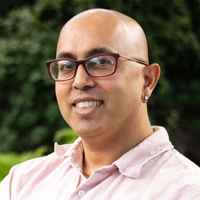 I am a huge proponent of artificial intelligence. In my research, I build systems that identify patterns that can be gleaned from your smartphone or any smart device. By studying student populations, we’ve been able to detect when students are suffering from depression and predict whether their GPAs will be above or below the university average. With this knowledge, we can provide additional support to students in need — just one example of the promise of AI.
I am a huge proponent of artificial intelligence. In my research, I build systems that identify patterns that can be gleaned from your smartphone or any smart device. By studying student populations, we’ve been able to detect when students are suffering from depression and predict whether their GPAs will be above or below the university average. With this knowledge, we can provide additional support to students in need — just one example of the promise of AI.
The term AI has been around for 60 years, and most of us were using it before the recent phenomenon of generative AI tools such as ChatGPT. We’ve used editing tools that predict the next word we’re going to type on our computers or smartphones. We have smart thermostats that learn our behaviors to optimize temperature comfort and energy use. We have audio assistants that fulfill our verbal commands.
In the past two years, though, advances in technology have allowed generative AI to flourish, to build incredibly large language models that are optimized to guess not only the next word you’re going to write, but entire documents. It can quickly and easily generate text, audio, images or video in response to a prompt. We’re living at an exciting inflection point similar to the dawn of the internet and the widespread adoption of the smartphone.
The University of Washington is a world leader in AI. The Allen School of Computer Science & Engineering is spearheading breakthroughs in natural language processing; UW Medicine is leveraging AI to enhance diagnoses; and the Astronomy department employs it to scan massive images of deep space and find planets, asteroids and other interstellar objects.
The iSchool will be at the forefront as the UW integrates these new technologies. I will serve as co-chair of a new university task force on AI, and our faculty are using their expertise to research ways to make optimal use of AI as well as deploy it ethically and responsibly. iSchool faculty including Mike Teodorescu, Lucy Lu Wang and Jevin West are applying AI to understand bias in our patent system, help patients make better health care decisions, and combat deepfakes and other problematic content. Professor Bill Howe is building small language models that you can run on your laptop, and he's demonstrating that they can perform just as well as the large ones at a fraction of the cost. He is piloting this method with the goal of deploying it across the UW.
In the classroom, we’re adapting our curriculum to equip graduates with the skills they need to have a dialogue with AI systems, which is fast becoming a critical skill. AI won’t replace the creative work people do, but those who understand how to use it as a partner will be better positioned for the workplace. To that end, we’re developing courses and certificate programs that will serve current students, alumni and other information professionals with a guided path that will help them succeed in their jobs.
Widespread adoption of generative AI comes with formidable challenges, including privacy concerns, a lack of transparency about how it works, and ethical considerations surrounding data usage and the use of copyrighted materials to build large language models. It opens a new front in the battle against misinformation, which AI can generate with ease. It is escalating the arms race between those who create deepfakes and those who detect them. At the iSchool, these are the kinds of challenges we embrace.
Today’s young adults don’t know a world without smartphones and high-speed internet. The next generation won’t know a world without AI. We will have our graduates ready for it.
Anind K. Dey
Dean and Professor
Winter 2024